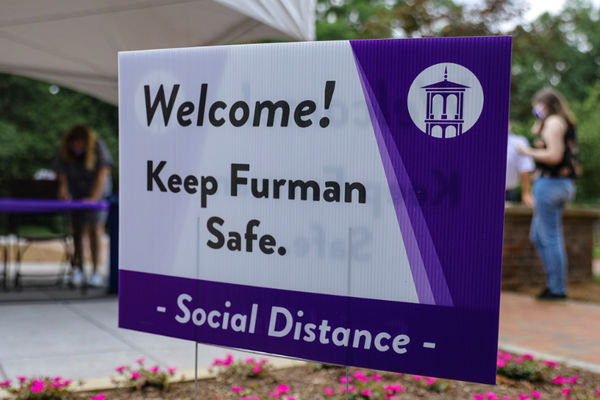There is no doubt that our return to campus this fall will be borderline draconian. Masks, to-go dining, hybrid class models and limited gatherings will inevitably constitute a new stifled “norm” of campus life. Yet the biggest change felt by the student body will not be a tangible safety precaution—it will be a sociological one.
Furman’s COVID-19 mitigation strategy relies heavily on student and faculty policing. It is now the job of the community to ensure that university rules are met, and if “reminding the offending party to uphold the ‘Paladin Promise’ is not a reasonable option, individuals may make a report” to the appropriate regulator. In a sense, we are not returning solely as students or comrades. We are now each other’s Thought Police, and the administration our Big Brother. It is our duty to divulge the missteps of our friends; to conspire against them should they violate the stringent, prude-like lifestyle outlined by the university. In a way, the risk of an individual’s potential expulsion lies in our temperamental, adolescent hands.
If the administration’s strategy truly relies on this dystopian “honor system” for semester-long success, it would be idealistic to think students will be on campus for any longer than a month. Let us state the obvious: students are not going to report their friends for having parties. Anybody who argues otherwise has forgotten that we, as a self-conscious youth, consistently feel the albatross of social popularity hanging around our necks—most would rather risk a bout of Corona than be isolated or slandered.
Certainly there will be outliers in the beginning. There will be those who claim to operate independently of peer pressure or conformity bias. There will be also be those who simply relish in busting parties, who crave the power rush that comes with angering sworn enemies or the annoying guy upstairs. And it is with these rebels that the Paladin Promise will truly die.
The anonymity of reporting that Furman guarantees is practically laughable. Rumors on a college campus have an R-zero value that dwarfs even the most aggressive pandemic. Any “undercover” student police officer will inexorably find themselves outed. They will be added to Furman’s own Burn Book; black-listed from parties and social gatherings. They will branded with a red A, and as a result other students will learn the “correct” course of action. Silence.
Humans are susceptible to operant conditioning. The minute social shaming begins, we immediately correct course so to avoid possible negative stimuli. Therefore, students will not turn in their friends. Not because they think potential rule breaking would be permissible, but because they will not risk their social health for the benefit of an invisible virus. Am I conceding that students lack the maturity to safely return to campus? Unfortunately, yes. Do I believe that students wish to see COVID spread? Not in the slightest. But I have little faith that anyone will risk the scary complications that will come with assuming the title of campus arbiter. The hypocrisy here is evident and startling—we wish to return to campus and stay there, yet we are unable to commit to do the very thing that ensures our deepest desires. So I guess this begs the larger question: where does this leave Furman’s reopening plan, and what is the fate of our semester?
